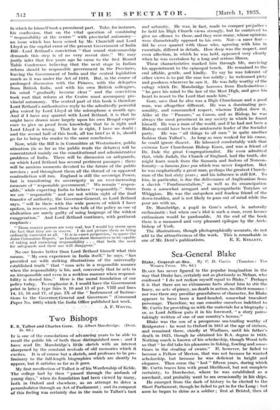Two Bishops
E. S. Talbot and Charles Gore. By Albert Mansbridgo. (Dent. 3s. 6d.) , • - - IT is one of the consolations of advancing years to be able to recall the public life of both these distinguished men : and I have read Dr. Mansbridge's little sketch with an interest sharpened by the constant revivals of old memories which it excites. It is of course but a sketch, and professes to be pre- liminary to the full-length biographies which are shortly to appear, but it satisfies as far as it goes.
My first recollection of Talbot is of his Wardenship of Keble. The college had by then " passed through the ambush of young days," when its foundation had been viewed by many, both in Oxford and elsewhere, as an attempt to drive a perambulator through an Act of Parliament ; and its conquest of this feeling was certainly due in the main to Talbot's tact
and urbanity. He was, in fact, made to conqueeprejudive : he held his High Church views strongly, but he contrived to give no offence to those, and they were many, whose opinions were diametrically opposed to his own. Nor—a rarer feat— did he ever quarrel with those who, agreeing with him in essentials, differed in details. How deep was the respect, and even affection, in which he was held, appeared very clearly when he was overtaken by a long and serious illness.
These characteristics marked him through life, surviving his appointment to the episcopal bench. He remained to the end affable, gentle, and kindly. To say he was tolerant of other views is to put the case too mildly ; he welcomed piety and goodness wherever he saw it. He was fully worthy of the eulogy which Dr. Mansbridge borrows from Ecclesiasticus : " he gave his mind to the law of the Most High, and gave his heart to resort to the Lord that made him."
Gore, save that he also was a High Churchman and a good man, was altogether different. He was a dominating per- sonality, and commanded respect, whereas Talbot drew it. Alike at the Pusetun," as Canon, and as Bishop, he was always the most prominent in any society in which he found himself. He was a man of the world, and if he had not been a Bishop would have been the aristocratic leader of the Socialist party. He was " all things to all men " in quite another fashion than Talbot's. As long as men worked for his cause, he could ignore dissent. He laboured comfortably with that extreme Low Churchman Bishop Knox, and was a friend of Dr. Dale the great Congregationalist. He even admitted that, while Judah, the Church of England, had the truth, she might learn much from the Samaria and Sodom of Noncon- formity—a famous faux pas which was never forgotten. But he was emphatically a great man, perhaps the greatest Church- man of the last sixty years ; and his influence is still felt. To him, in particular, is due the deliverance of Anglicanism from a slavish " Fundamentalism," as well as its emancipation from a somewhat arrogant and unsympathetic Toryism or - Whiggism. He was the outspoken and fearless friend of the down-trodden, and is not likely to pass out of mind while the poor are with us.
Dr. Mansbridge, a pupil in Gore's school, is naturally enthusiastic : but when one's idol is such a man, even keener enthusiasm would be pardonable. At the end of the book there is a measured and d very pleasant epilogue by the Arch- bishop of York.
The illustrations, though photographically accurate, do not add to the attractiveness, of the work. This is remarkable in
one of Mr. Dent's publications. E. E. KELLEIT.


























































 Previous page
Previous page